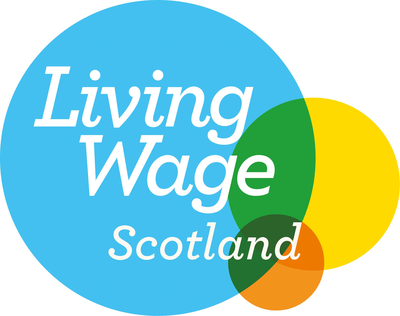- More than 52,000 Living Wage workers in Scotland are set for a pay boost as the new real Living Wage of £9.90 is announced
- More than £310 million in extra wages has gone to low-paid workers in Scotland since the start of the Living Wage movement.
- Over £112 million in extra wages has gone to low-paid workers in Scotland since the start of lockdown with a record number of new employers signing up for Living Wage accreditation in that period [1]
- Despite these successes, 333,000 employees in Scotland are still paid below the Living Wage
Over 52,000 people working for more than 2,400 real Living Wage Employers in Scotland are set for a vital pay boost as the new Living Wage rate rises to £9.90 across the UK (40p increase) supporting workers and families. The Living Wage rates are the only rates independently calculated based on what people need to live on.
New research from the Cardiff Business School shows Living Wage workers in Scotland have benefitted from more than £310m in extra wages since the start of the Living Wage employer movement in 2001.
The new Living Wage rates and the ‘National Living Wage’ – know the difference
The increase in the real Living Wage rate this year has largely been driven by sharply rising fuel and rent costs. The real Living Wage is different to the Government minimum wage for over 23s, called the ‘National Living Wage (NLW). While the real Living Wage is independently calculated based on living costs and is paid by employers voluntarily, the government’s NLW is based on a percentage of median earnings, and all employers are required to pay it. [3]
The Living Wage movement continues to grow
Since the start of lockdown in March 2020, more than 700 employers have become accredited Living Wage employers through the Living Wage Scotland programme at the Poverty Alliance.
Major Living Wage Employers in Scotland include SSE, abrdn, AG Barr, Morrison Construction and DC Thomson
These organisations join a network of over 2400 Scottish employers, and nearly 9,000 employers across the UK, including half of the FTSE 100 companies, major household names and thousands of small businesses, who are choosing to pay the real Living Wage to ensure all staff earn a wage that covers their everyday needs.
Low pay in the UK
The announcement of the new rates comes as new research by the Living Wage Foundation has demonstrated the scale of low pay during the pandemic, with 4.8 million jobs (17.1% of employee jobs in the UK) still paying less than the real Living Wage. Scotland is the nation with the highest proportion of jobs paying at least the real Living Wage (85.6%) compared to England (82.8%), Wales (82.1%) and Northern Ireland (78.7%). [2]
Nicola Sturgeon, First Minister of Scotland, said:
“The Scottish Government believes that all workers should be paid fairly. I am proud that Scotland leads the UK in payment of the real Living Wage and applaud the increasing number of employers who are realising the benefits of doing so and are making that commitment.
“However, there is more to do, and I encourage all organisations regardless of size, sector or location to seek accreditation and ensure that everyone receives a fair day’s pay for the work they do.
“The Scottish Government is playing its part and last month we announced that companies bidding to win government contracts will in future have to pay the real Living Wage.”
Peter Kelly, Director of the Poverty Alliance said:
“Thousands of workers in Scotland will benefit from a welcome pay rise due to their employer choosing to pay the new real Living Wage rate of £9.90 per hour. We all need an income that is enough to cover our needs and protect us from poverty, and it’s only right that employers pay a wage that reflects the cost of living. Too many workers in Scotland are paid less than the real Living Wage and, at a time of rising costs, are struggling to stay afloat. The real Living Wage can offer protection from those rising costs, and we’re urging more employers to choose to commit to at least the real Living Wage and help loosen the grip of poverty in Scotland.”
Kate Wallace Lockhart, Head of Social Impact at SSE, and Chair of the Living Wage Scotland Leadership Group said:
“Fair wages and good conditions for workers are central to ensuring a just transition as we move post-pandemic to a net zero economy.”
“The growth in the number of Living Wage accreditations over the last year is inspiring – and every single Living Wage employer should be celebrated. But the fact there are still 333,000 workers across Scotland that earn below the real Living Wage shows there’s still more action needed to make sure we have good, well-paid jobs that set the Scottish economy up for the future.”
Lynn Anderson, Living Wage Scotland Manager said:
“Record numbers of Scottish employers have joined the Living Wage movement in the past 18 months, because they recognise that committing to a wage that covers everyday needs is a necessary and sensible investment in their workforce. During Living Wage Week, it’s important to highlight those employers that have done right by workers and families, providing them with much needed security and stability even when times are hard. We hope to see even more employers commit to the real Living Wage, to support more workers to keep their heads above water as costs rise”.
